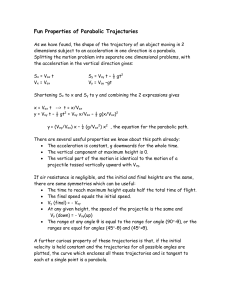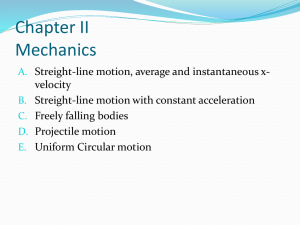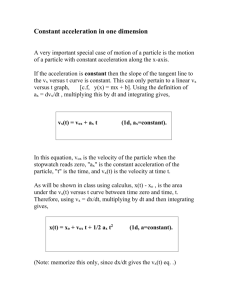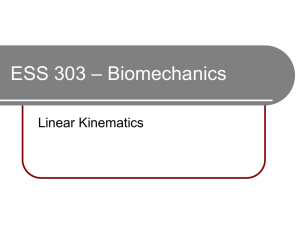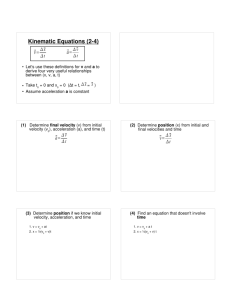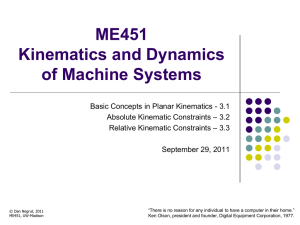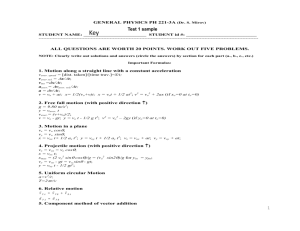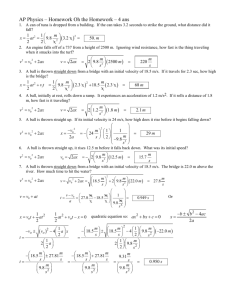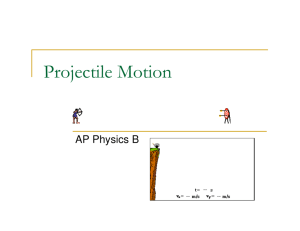Kinematics
advertisement
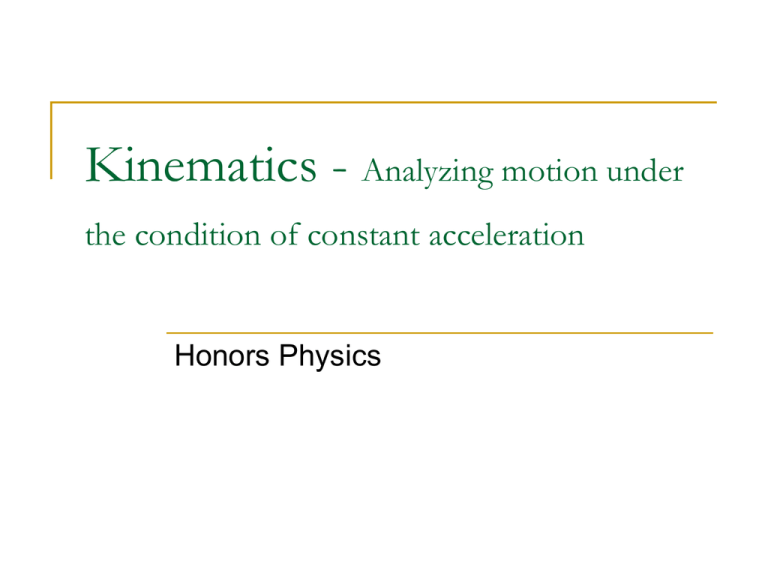
Kinematics - Analyzing motion under the condition of constant acceleration Honors Physics Kinematic Symbols x,y Displacement t Time vo Initial Velocity v Final Velocity a Acceleration g Acceleration due to gravity Kinematic #1 v vo v a t t v vo at v vo at Kinematic #1 Example: A boat moves slowly out of a marina (so as to not leave a wake) with a speed of 1.50 m/s. As soon as it passes the breakwater, leaving the marina, it throttles up and accelerates at 2.40 m/s/s. a) How fast is the boat moving after accelerating for 5 seconds? What do I know? vo= 1.50 m/s a = 2.40 m/s/s t=5s What do I want? v=? v vo at v (1.50) (2.40)(5) v 13. 5 m/s Kinematic #2 2 1 x vox t at 2 b) How far did the boat travel during that time? 2 1 x vox t at 2 2 1 x (1.5)(5) (2.40)(5 ) 2 x 37.5 m Does all this make sense? 13.5 m/s A bh A (5)(1.5) A 7.50 m A bh A (5)(1.5) A 7.50 m 1 1 A bh (5)(12) 2 2 A 30 m 1.5 m/s Total displacement = 7.50 + 30 = 37.5 m = Total AREA under the line. Kinematic #3 v v 2ax 2 2 o Example: You are driving through town at 12 m/s when suddenly a ball rolls out in front of your car. You apply the brakes and begin decelerating at 3.5 m/s/s. How far do you travel before coming to a complete stop? What do I know? vo= 12 m/s a = -3.5 m/s/s V = 0 m/s What do I want? x=? v 2 vo2 2ax 0 122 2(3.5) x 144 7 x x 20.57 m Common Problems Students Have I don’t know which equation to choose!!! Equation Missing Variable v vo at x x vox t 1 at 2 2 v v 2ax 2 2 o v t Kinematics for the VERTICAL Direction All 3 kinematics can be used to analyze one dimensional motion in either the X direction OR the y direction. v vo at v y voy gt 2 2 1 1 x vox t at y voy t gt 2 2 2 2 2 2 v vox 2ax v y voy 2 gy Examples A pitcher throws a fastball with a velocity of 43.5 m/s. It is determined that during the windup and delivery the ball covers a displacement of 2.5 meters. This is from the point behind the body to the point of release. Calculate the acceleration during his throwing motion. What do I know? vo= 0 m/s What do I want? a=? Which variable is NOT given and NOT asked for? TIME v v 2ax 2 2 o x = 2.5 m V = 43.5 m/s 43.52 0 2 2a (2.5) a 378 .45 m / s 2 Examples How long does it take a car at rest to cross a 35.0 m intersection after the light turns green, if the acceleration of the car is a constant 2.00 m/s/s? What do I know? vo= 0 m/s x = 35 m a = 2.00 m/s/s What do I want? t=? Which variable is NOT given and NOT asked for? Final Velocity x vox t 1 at 2 2 35 (0) 1 (2)t 2 2 t 5.92 s Examples A car accelerates from 12.5 m/s to 25 m/s in 6.0 seconds. What was the acceleration? What do I know? vo= 12.5 m/s v = 25 m/s t = 6s What do I want? a=? Which variable is NOT given and NOT asked for? DISPLACEMENT v vo at 25 12.5 a(6) a 2.08 m / s 2 Examples A stone is dropped from the top of a cliff. It is observed to hit the ground 5.78 s later. How high is the cliff? What do I know? v = 0 m/s oy g = -9.8 m/s2 t = 5.78 s What do I want? y=? Which variable is NOT given and NOT asked for? Final Velocity y voy t 1 gt 2 2 y (0)(5.78) 4.9(5.78) 2 y 163.7 m h 163.7 m
